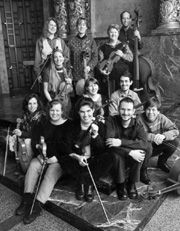WHEN THE ENGLISH TASTE for Italian baroque opera began to wane around 1740, Georg Friedrich Handel switched to composing oratorios—essentially, unstaged Biblical operas that combined his flair for drama and his gift for melody with a generous dose of pious uplift.
Seattle Baroque/Tudor Choir
St. Mark’s Cathedral December 8-10
Messiah, one of his first successes, premiered in 1742 in Dublin. But the ever-practical Handel adapted it slightly for its first London performance the next year and revised it yet again for a 1745 performance—in each case taking advantage of whatever performing forces were available. Seattle Baroque and the Tudor Choir joined forces last year for an elegant and sensitive reading of the work just as it was first heard in Dublin. They’re continuing the cycle this weekend, recreating Messiah‘s 1743 London premiere. Handel had six soloists in this performance, and he composed a couple of new arias and reassigned others. Also, the 1743 performance is said to be the one at which George II stood for the “Hallelujah Chorus,” thus initiating a tradition that has persisted to this day.
Scott Metcalfe will conduct, filling in for Tudor Choir director Doug Fullington, who’s off touring with the Tallis Scholars. For Seattle audiences, the most familiar name among the soloists will probably be soprano Cyndia Sieden, who is about as versatile a soprano as there is; we’ve heard her as the Queen of the Night for Seattle Opera and singing a work by contemporary Russian composer Giya Kancheli with the Seattle Chamber Players. Other featured soloists for this Messiah include soprano Judith Overcash, mezzo-soprano Rosemarie van der Hooft, tenors Peter Butterfield and Ryan Turner, and bass-baritone Daniel Lichti.
SEATTLE BAROQUE MEMBERS, meanwhile, have been busy with various recording projects. Harpsichordist Byron Schenkman’s most recent releases are a disc of music by Jean-Henri d’Anglebert and, with Seattle Baroque members, a splendid recording of four Bach harpsichord concertos (both on the Centaur label). The “orchestra” on this disc includes just one player for each of the string parts, providing maximum transparency, sparkle, and chamber-music intimacy, with no lack of drama or drive.
Violinist Ingrid Matthews, Seattle Baroque’s music director, tackled a more daunting project for this Bach anniversary year, releasing a two-CD set of the six solo sonatas and partitas (Centaur). Laid up with tendinitis in recent months, she plans to makes this Messiah her return performance.
The next Seattle Baroque recording project will be released next spring and features bassoonist Michael McCraw as soloist on a disc of Vivaldi concertos; it’s the second release of Seattle Baroque’s four-CD contract with the Centaur label, a measure of the excellence this local group has achieved since its 1994 debut.







